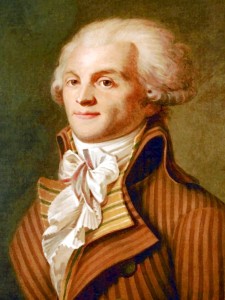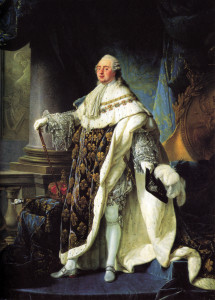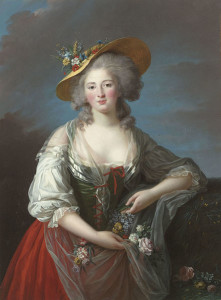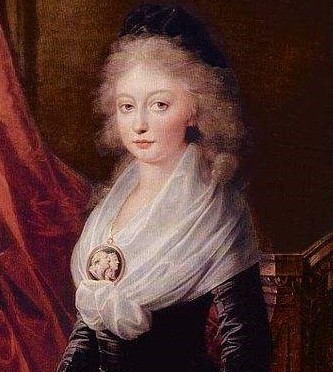It’s strange to start out with the moral at the beginning of the story, but that’s exactly what I’m going to tell you. No, Maximilien Robespierre will tell you:
“Citizens, take warning; you are being fooled by false notions.”
Those words are taken from an address to justify the execution of Louis XVI.
It also sums up what others would feel toward Robespierre as time went on. Basically, it leads to the question: What is truth?
Maximilien Robespierre had pushed for Louis XVI’s execution but wasn’t for Princess Elisabeth’s, the King’s sister.
Yet, she was executed May 10, 1794. And a couple months later, Robespierre would be executed.
The lives of the Princess, the King, and the Tyrant were connected way before the French Revolution.
Losses
An important place to start is the year of 1764. It was important to both the Robespierre and the Bourbon families.
In May, Maximilien Robespierre turned six, and the royal Bourbons welcomed a baby princess.
In July, Robespierre’s mother gave birth—to a stillborn son. She died soon after. Robespierre’s sister recalled in her memoirs this death changed him. He lost his childhood. In addition to that, his father left the family. The man who was supposed to be one of the most important role models in a young boy’s life distanced himself from his children. I consider this to be Robespierre’s first major rejection.
The Bourbon children lost their parents to death within three years of Princess Elisabeth’s birth.
Successes
Despite losing parents young, Louis, Elisabeth, and Robespierre were all very intelligent and accomplished individuals. Just to mention some examples: Louis excelled in languages; Elisabeth in mathematics; Robespierre in rhetoric. All three wanted to be models of virtue. The Bourbon children took a religious approach while Robespierre leaned on secular philosophies.
Elisabeth carried a certain charm from her earliest days. Despite being a wild child, Elisabeth grew up to be lovely and known for her piety and wit. There were three proposed marriages, but in the end, she and her brother, now King, agreed that she would stay with the family.
Sometime early in Louis’ reign, he and his wife stopped by the school Robespierre attended. In fact, Robespierre was handpicked to give a speech in Latin at the special ceremony for the King and Queen. It turned out to be a dismal day. It was rainy, the monarchs were running late, and when they did arrive, they stayed in their carriage for the speech and ceremony. They left promptly after the ceremony. Robespierre had just been rejected by high society.
Life’s not fair! Right, Robespierre?
But Robespierre was a bright student and would eventually move up his way into politics after completing school. He started on a small scale during the king’s early reign. Louis and Marie-Antoinette had more of a positive image then.
To someone like Robespierre, it probably seemed as if the King had everything. Besides not agreeing with the King’s politics, I think there were other things that Robespierre would find bothersome about the King. Louis XVI had obtained power through family deaths. He had a beautiful family, and he had a live sibling born in 1764. The King got a free pass while Robespierre slaved away to get to the top.
Annoying Sister
Elisabeth annoyed her sister-in-law at times. She could surprise her brother. But there was never any doubt that these individuals cared for one another, and that the King and Queen would be eternally grateful to Elisabeth for staying with the family to the very end.
Elisabeth felt she was following God’s plan for her. She was heaven sent in the eyes of Louis and his family.
She was certainly a type of nuisance for Robespierre. If only she had escaped like some of her other family members, he wouldn’t have been caught in a desperate situation. He fought for her at her trial. But he lost. He just wanted her to be exiled, not guillotined.
People marveled at her poise during her trial and execution.
She had just turned thirty the week before she was executed in May 1794.
Fooled by False Notions
More and more people considered themselves “fooled by false notions.” The new government had stressed equality and virtue— so why were so many being punished and put to death?
Robespierre and his comrades became distrustful of one another. They too felt they had been fooled. They weren’t as loyal as they professed they would be. He had helped to reform this new society, and now he and former allies were betraying each other. This was Robespierre’s third and final rejection.
Robespierre was executed in July 1794. Had his stillborn brother lived, he would have turned thirty a few weeks before—the same age as Elisabeth, who had met her death in her birthday month of May for being loyal to family. An eerie coincidence.
While I don’t accept that Robespierre is scapegoat of history, I do feel sorry for him. He had all these ambitions and felt that to fulfill them, he needed to take away life. In the end, the curse he set on so many rebounded on him.
Sources:
Maxwell-Scott Mary Moniac. Madame Elizabeth de France, 1764-1794.
Robespierre, Charlotte. Charlotte Robespierre’s Memoirs: Part 1.By http://revolution-fr.livejournal.com/2370.html accessed August 16, 2016.
Ten Brink, Jan. Robespierre and the Red Terror. 1899.
Trail and Execution (French): de Beauchesne, Alicide-Hyacint
Images:
Princess Elisabeth of France by Louise Élisabeth Vigée Le Brun (Public domain in U.S.) 1782
Portrait of Louis XVI by Antoine-Francois Callet. 1788 (Public Domain in U.S.)
Portrait of Maximilien Robespierre. 1790 (Public Domain in U.S.)





